The market is more than just a shopping destination; it's also a place to immerse yourself in the local culture. Because Jeju has a thriving market, it's a good idea to pick up souvenirs or regional specialties throughout your trip. There are well-known restaurants in the market, so many visitors come on purpose. You can visit the permanent market, which is open every day, or, if you have the opportunity, visit the five-day market.
Jeju's major market
Dongmun Traditional Market
Opened in 1945, it is the largest permanent market in Jeju Island. It is about a 20-minute drive from Jeju International Airport, and many restaurants have been promoted in the media, making it the most popular destination for visitors. It is also a good idea to buy souvenirs because you can send them directly via courier. You can buy cutlassfish, tilefish, citrus, Omegi-tteok (rice cake), chocolate, and other souvenirs.
· The fish market is large to account for 40%. If you buy it at the market, you can eat a wider variety of fish at a lower cost than in a traditional sashimi restaurant. · After 7 pm, there is a night market near Gate 8.
There are a total of 12 entrances to Dongmun Traditional Market and four parking lots around the market. The central parking lot in front of Gate 6 is the largest parking lot around the market. But the fare is a little more expensive for a private parking lot. If you take the bus, you can catch bus numbers 312, 315, 316, or 325. · Public parking lot fees: Free for the first 30 minutes / ₩1,000 for 31-45 minutes / ₩500 for every additional 15 minutes; · Private parking lot fee: ₩1,000 for the first 30 minutes / ₩500 for every additional 15 minutes
- Jejuice
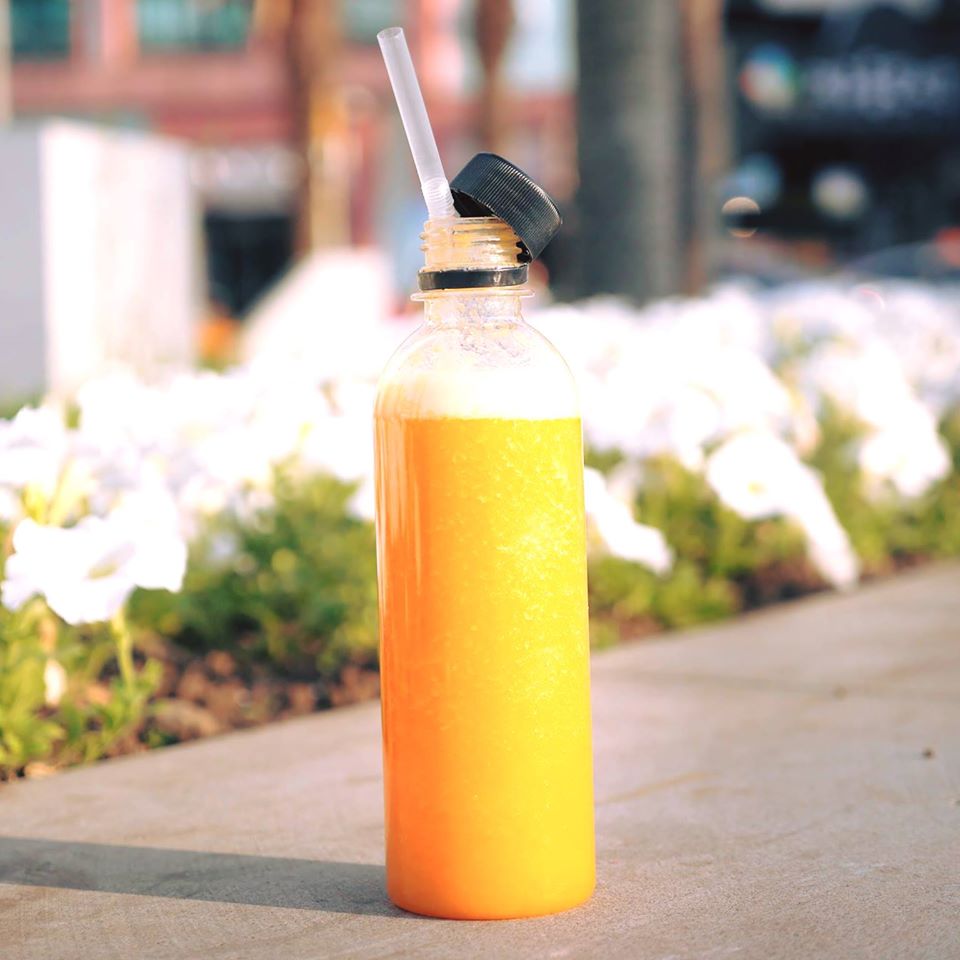
facebook.com/enjoydongmun/photos/a.1170281843081764/1203689709740977/?type=3&theater
It is a location that only sells freshly squeezed juice. They get their fruits directly from farms and grind them without using water in the store. Let's try Bong coffee, made with Hallabong and coffee.
- Jina Tteokjip
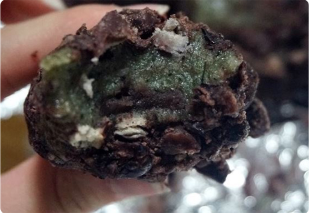
ok114.co.kr/ntnw/search/searchCompanyOfMainPh.crz;jsessionid=D430DAD8A306CDD7F76124B8B3730662?phone_number=0647570229#header
It is a rice cake shop famous for Omegi-tteok. It is especially popular because it has been featured in various media. It's best to arrive early because it closes when the ingredients are depleted.
- Sarang Bunsik
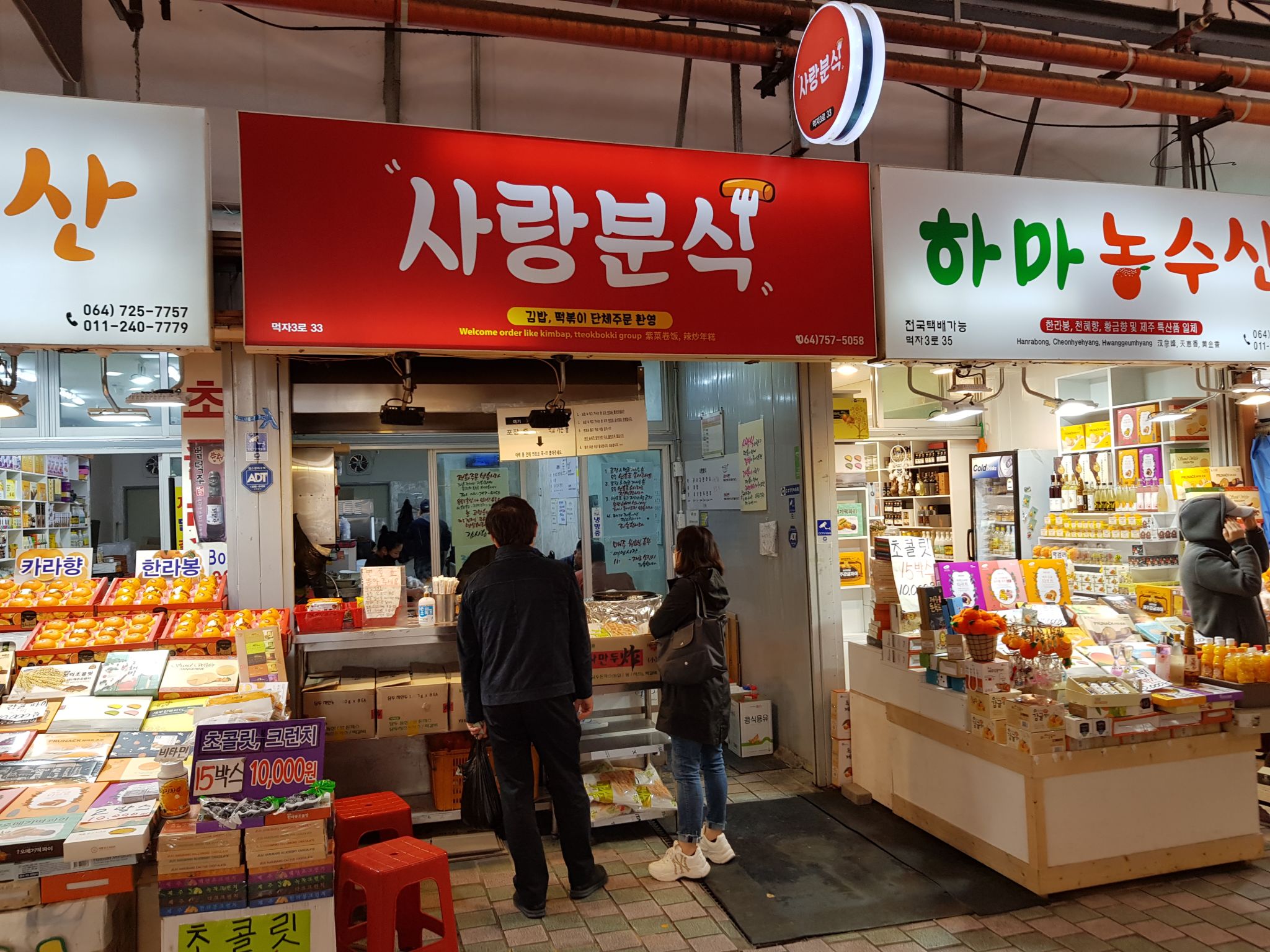
컴퍼스 6
It is a representative snack bar on Jeju Island that is popular enough to have waiting lists. Representative menu items include Tteokbokki (spicy rice cake), Gimbap (rice rolled in seaweed), Eomok (fish cake), and Mandu (dumplings).
- Hotteok Alley
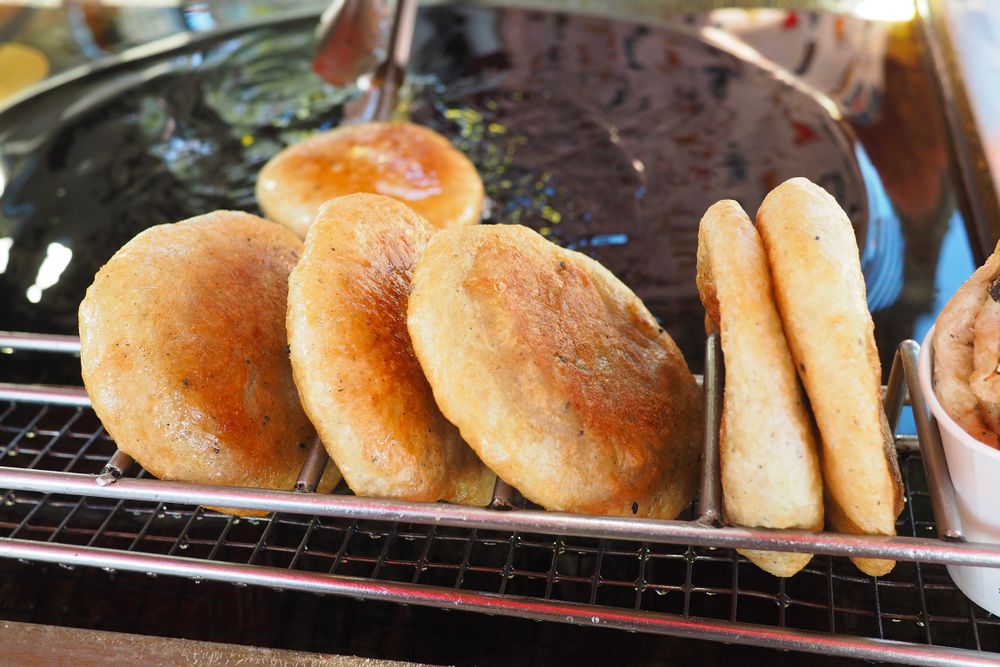
shutterstock.com
When you enter Gate 1, you will see a line of Hotteok carts. Among them, Dongmun Hotteok is the most well-known, and you must wait in line to eat.
- Jeju Jungang Underground Shopping Center
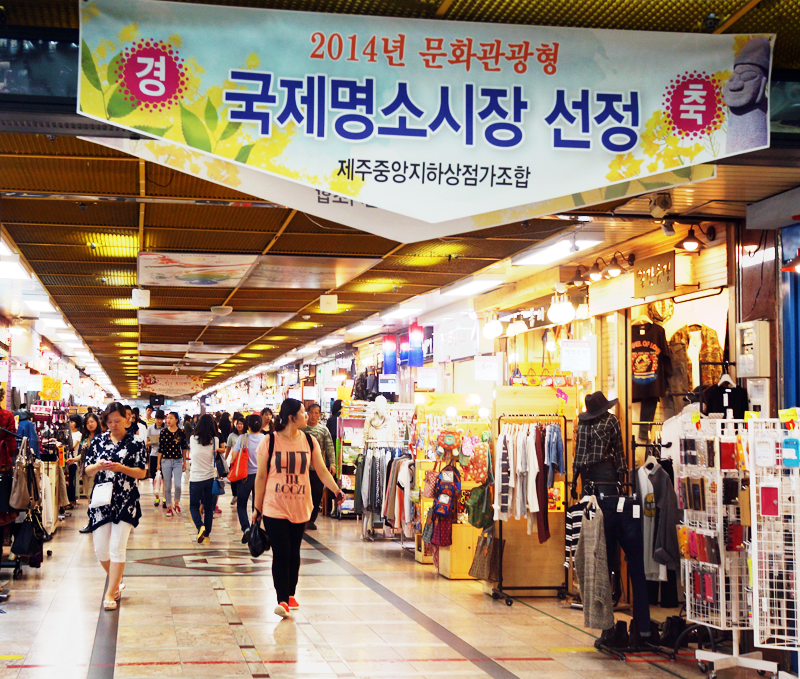
facebook.com/jejujungangshoppingmall/photos/a.596641850447340/614140802030778/?type=3&theater
It is an underground shopping mall from Dongmun Traditional Market to Gwandeokjeong Pavilion. It is home to more than 400 stores, where visitors can see various items such as clothing, cosmetics, and accessories.
- Sanjicheon Stream
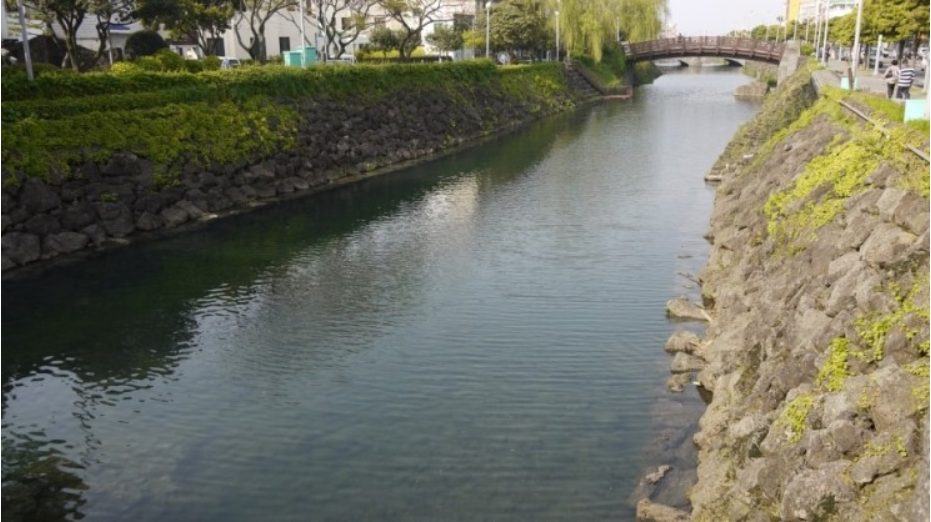
blog.naver.com/jejumarket09/140158203621
A stream with a promenade and a park on the opposite side of the Dongmun Traditional Market. You can enjoy a music fountain show and a night view at night, so if you go to the night market, make sure to stop by here as well.
- Black Pork Street

suanmeizai.blog/2019/06/29/jeju-and-seoul-trip-from-15-jun-to-26-jun-2019-part-1-jeju-island/
It is a place where you can find many well-known restaurants serving black pork, a Jeju Island specialty. It is located in the city center, so after your meal, take a stroll down Chilseong-ro Shopping Street and Tapdong Plaza.
- Chilseong-ro
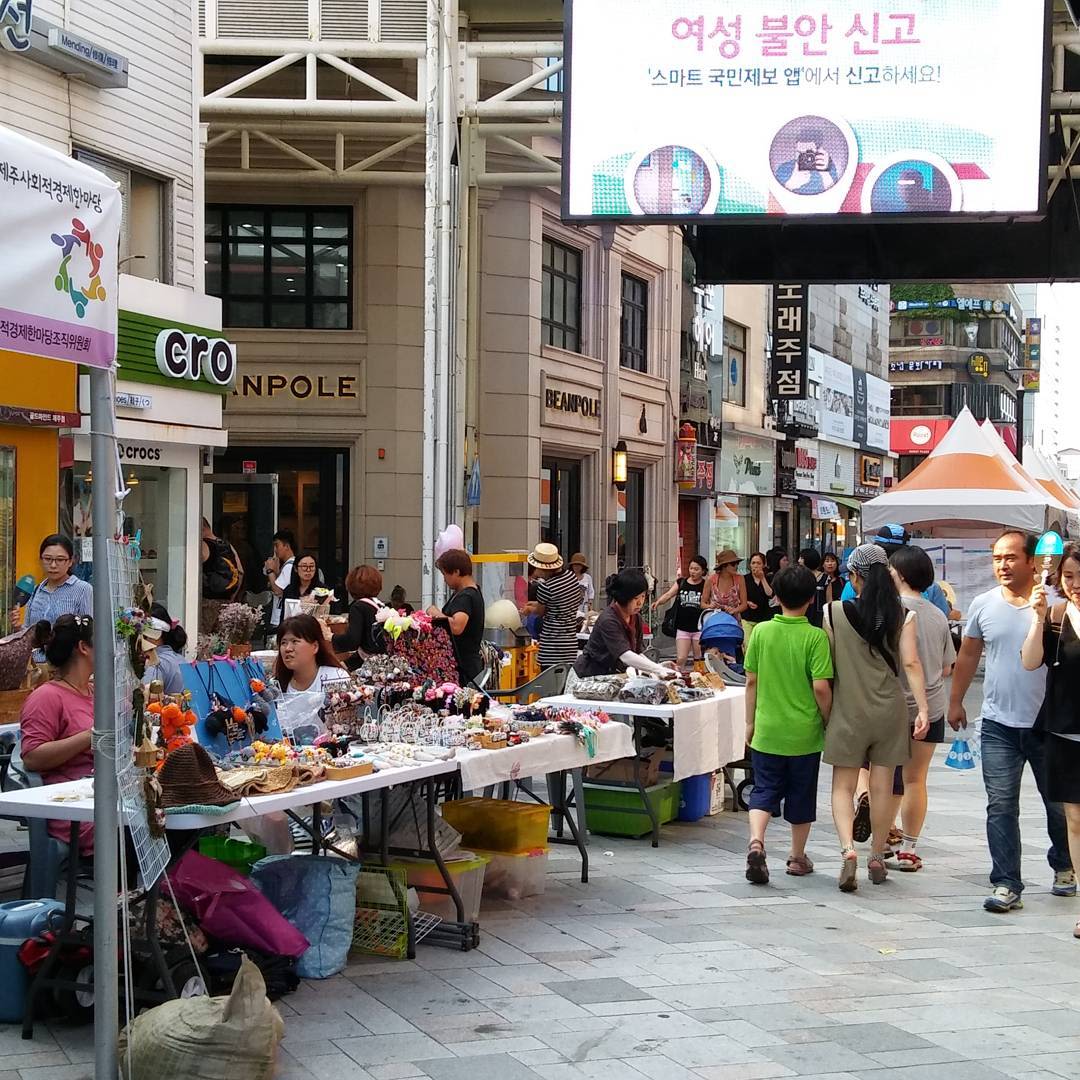
instagram.com/p/BIcFPoXhD__/
It is the representative shopping center of Jeju Island, similar to Myeongdong in Seoul. It has a different atmosphere compared to Jeju Jungang Underground Shopping Center because it primarily sells branded products.
- Gwandeokjeong Pavilion
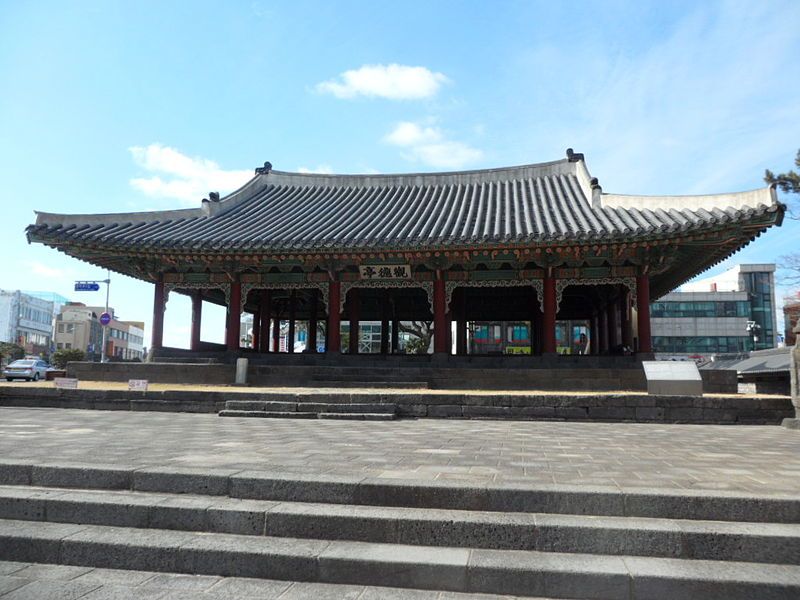
commons.wikimedia.org/wiki/File:Gwandeokjeong_Pavilion_2.JPG
A building built to serve as a training ground for soldiers during the Joseon Dynasty. It is the oldest remaining building in Jeju.
Largest permanent market in Seogwipo City
Seogwipo Maeil Olle Market
It is the biggest permanent market in Seogwipo City. This market is on Olle course 6, so it is frequented by many Olle Trail visitors. It is a market that sells a variety of snacks, including Omegi-tteok, Modakchigi (Tteokbokki mixed with Gimbap, Mandu, and fries), and Manon chicken. There is a long bench in the middle of the market where you can enjoy your snacks and rest. The public parking lot is right next to it and is quite large, making it an ideal destination for those arriving by car.
Seogwipo Maeil Olle Market is cross-shaped and has an entrance at the end of each road. There are two public parking lots around the market. If you come by bus, you can take 510, 531, or 532. · Public parking lot fees: Free for the first 30 minutes / ₩1,000 for 31-45 minutes / ₩500 for every additional 15 minutes
- Udo Dwaejinae Ttangkong Mandu
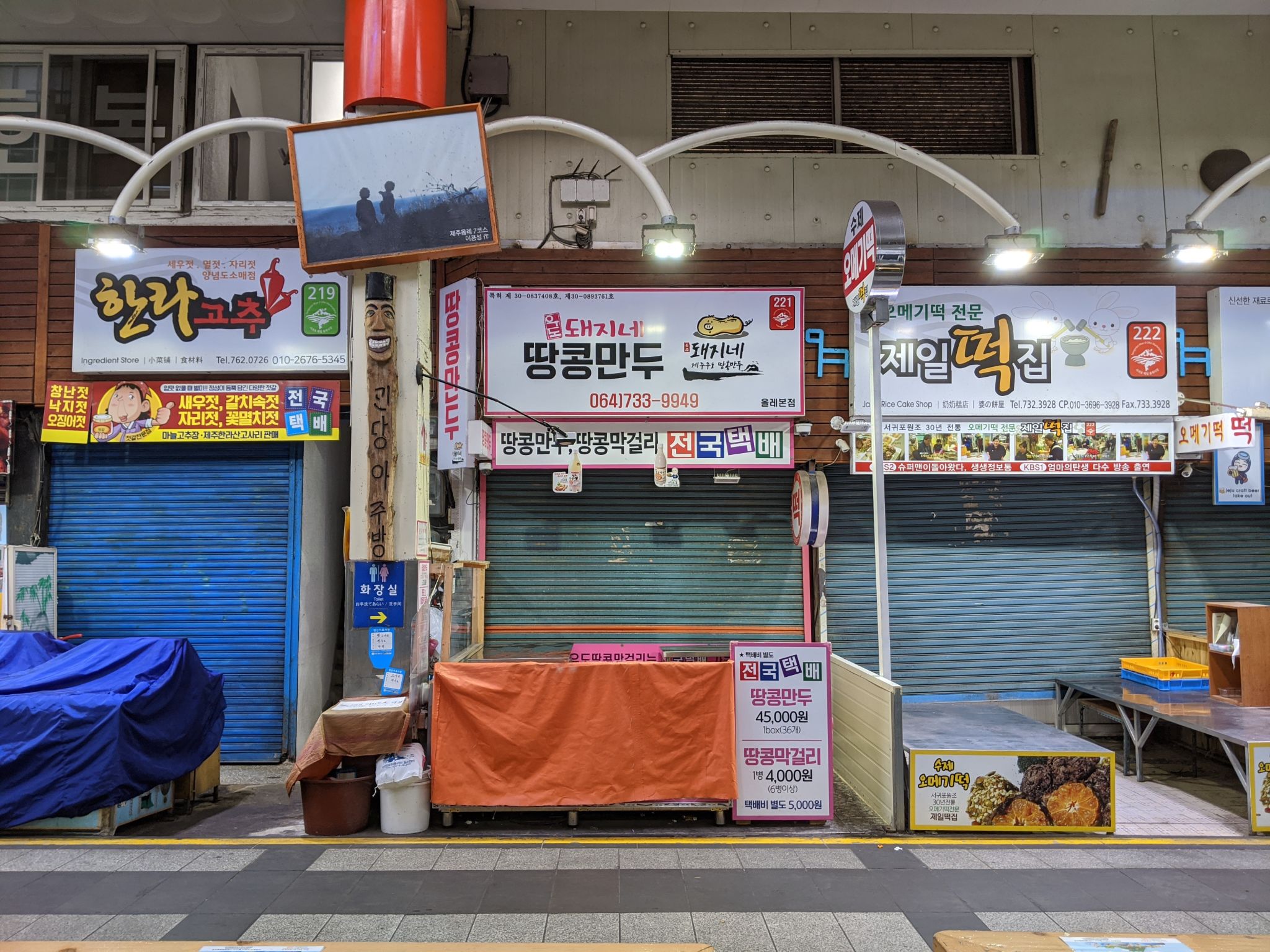
컴퍼스 6
Mandu (dumplings) made from Udo peanuts are popular. It tastes nutty every time you chew peanut powder on the dumpling wrappers.
- Manong Chicken Jungang Tongdak
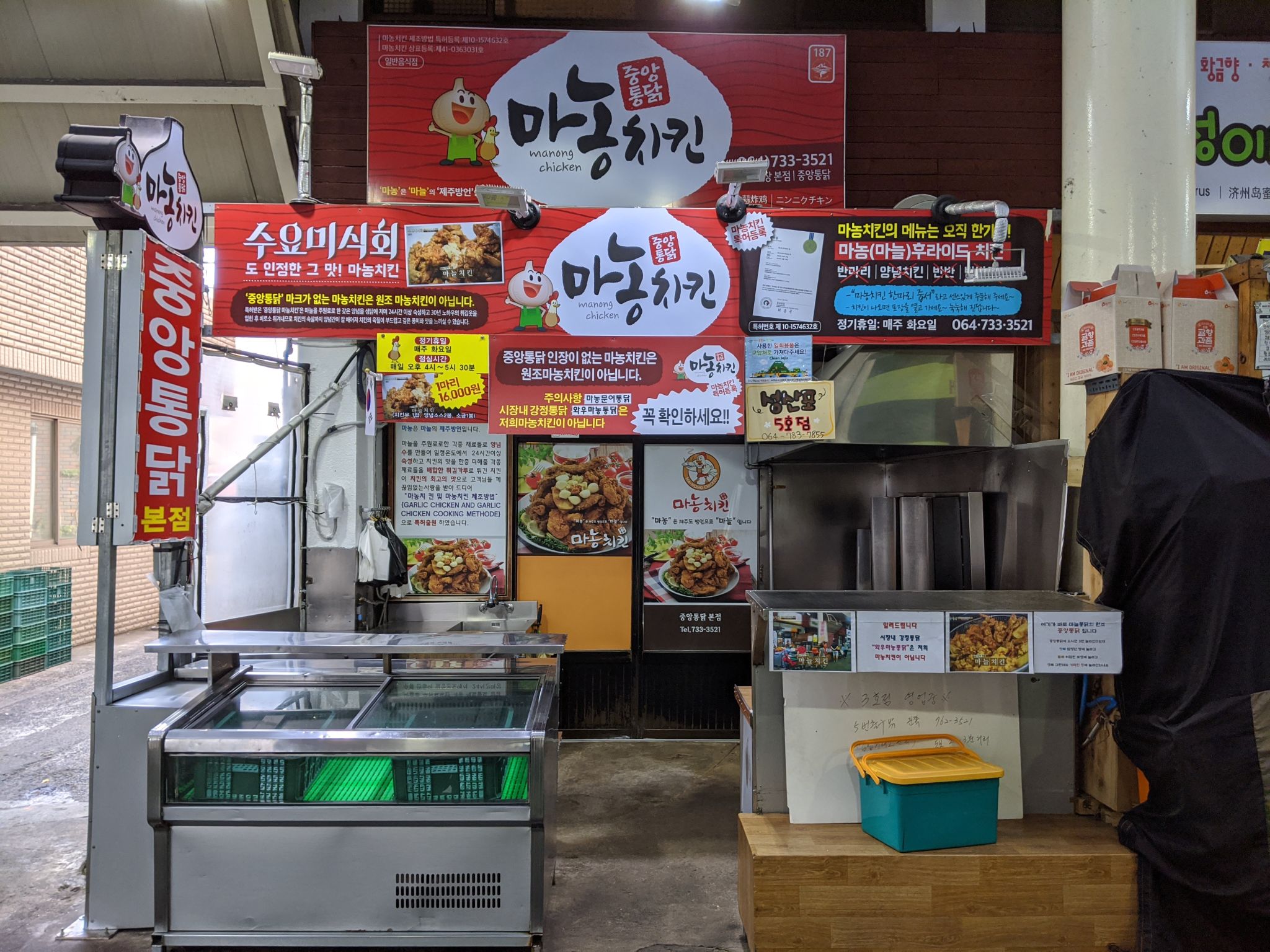
컴퍼스 6
This is the original Manong Chicken restaurant. Manong is a Jeju dialect of garlic that is non-greasy and has a unique flavor due to the garlic flavor in the fries.
- Cheonjiyeon Falls
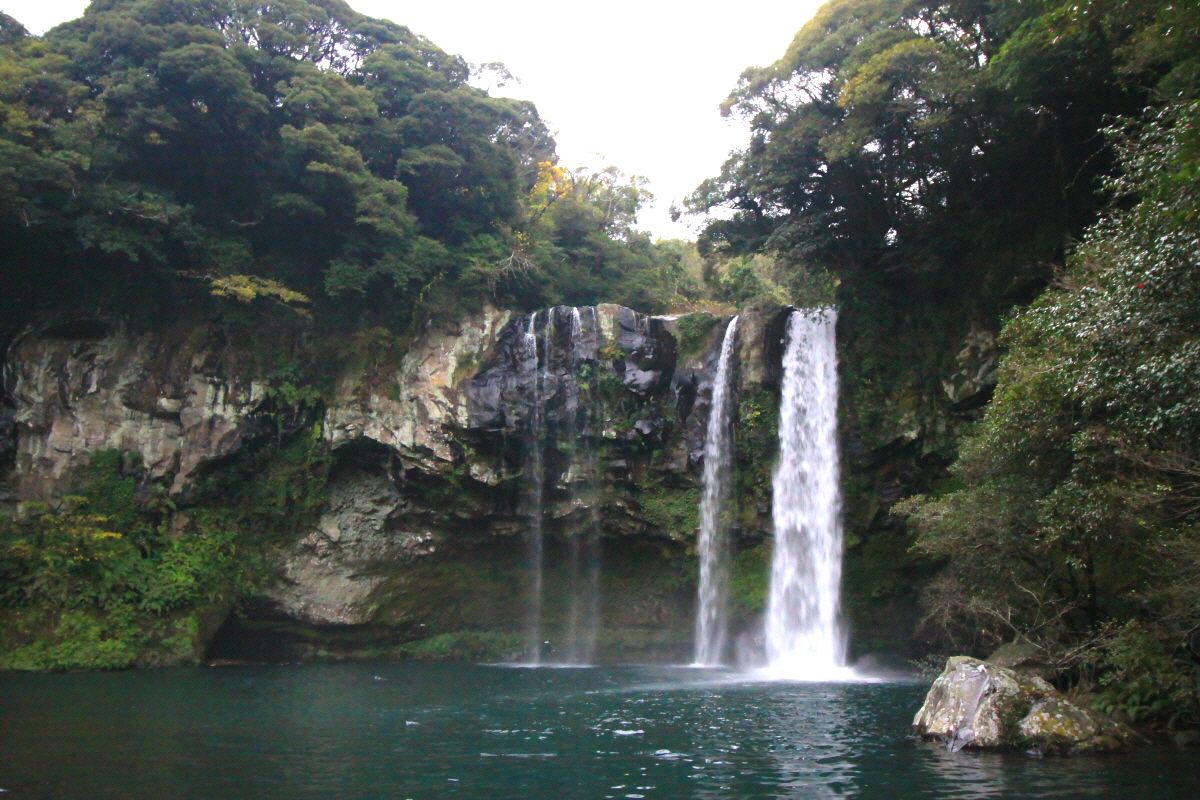
박영진 님의 사진
It is one of Jeju Island's three largest waterfalls, measuring 22 m in width and 12 m in height. Evergreen trees and plants form a warm temperate forest area around the waterfall, keeping it cool even in midsummer. There is also a walkway.
- Jeongbang Falls
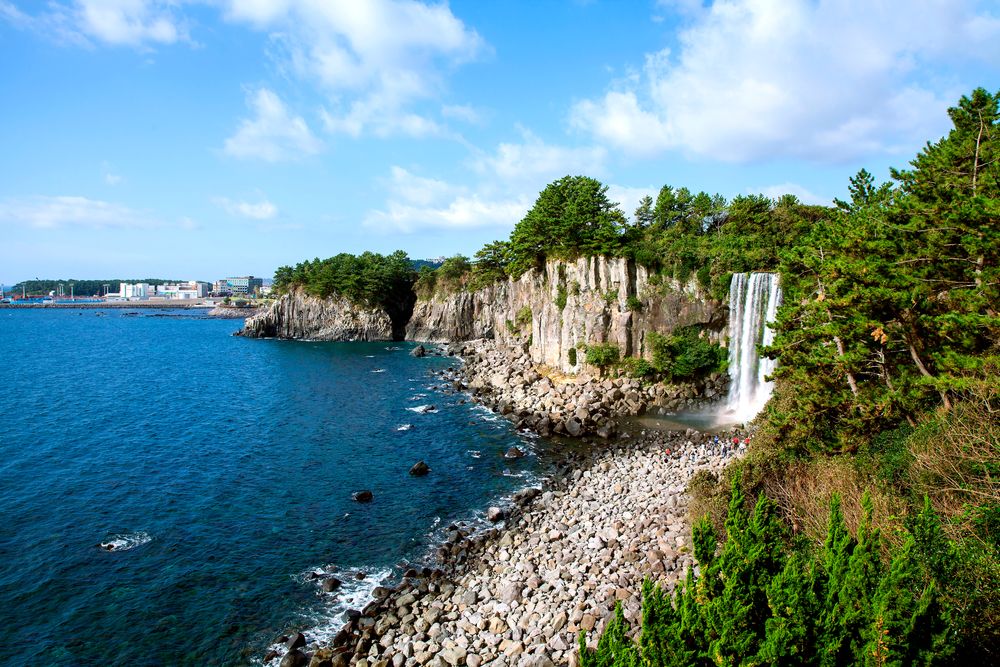
shutterstock.com
It is Korea's only waterfall that falls directly into the sea. Despite being similar in size to Cheonjiyeon Falls, Jeongbang Falls feels much larger when it falls.
- Lee Jung Seob Street
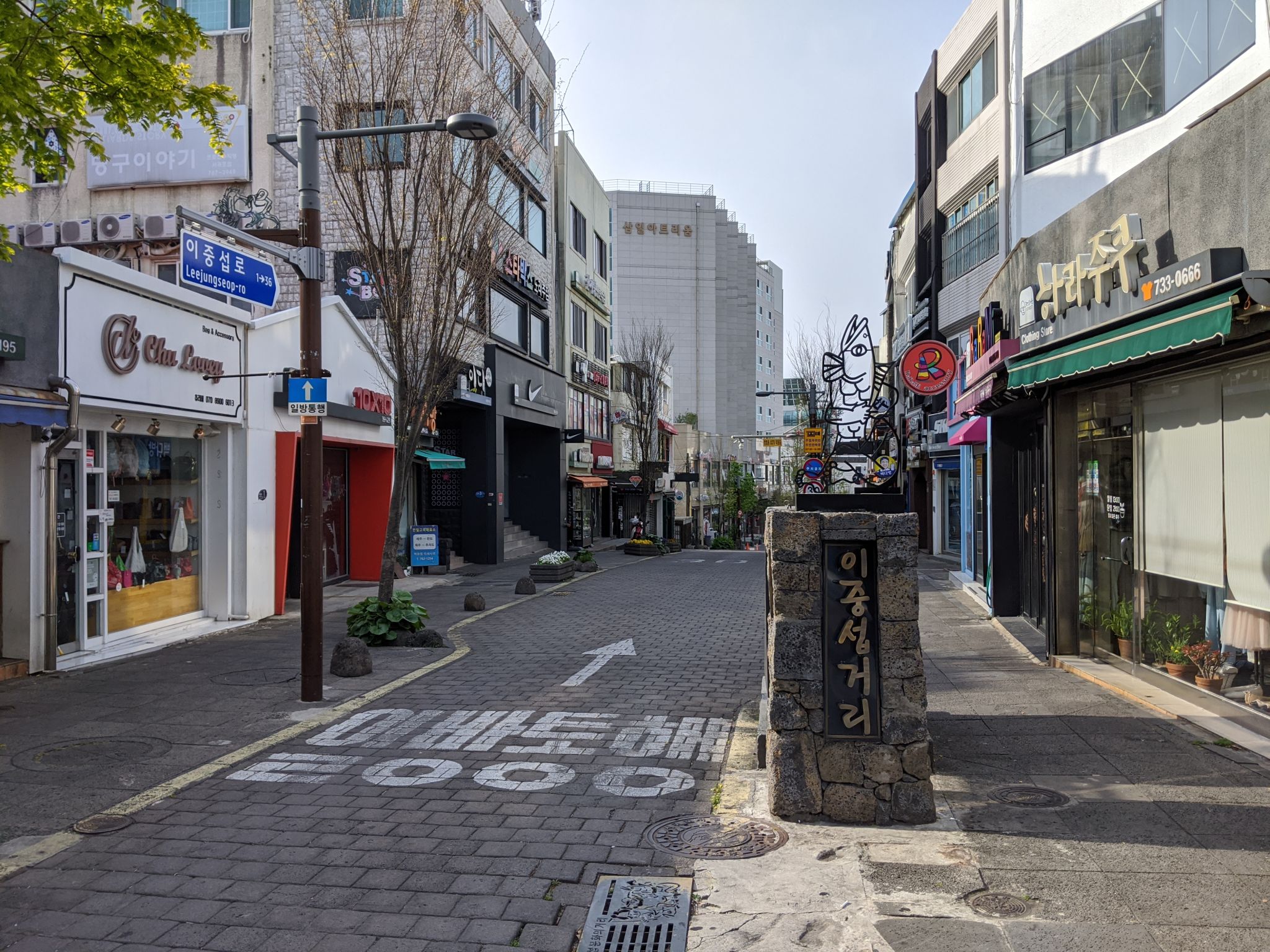
컴퍼스 6
This street was built to commemorate Lee Jung Seob, a young painter who died. Visitors can browse souvenirs and handicrafts featuring illustrations by Lee Jung Seob.
Jeju Meat Specialty Market
Seomun Public Market
Seomun Public Market is smaller than Dongmun Traditional Market, but it offers everything you need, including seafood, vegetables, and a variety of foods. Many people want to shop cheaply without crowds. It is specifically designated as a meat-specialized market and produces the majority of the meat consumed on Jeju Island. After purchasing black pork, you can take it to a designated restaurant and eat it for half the price of a regular restaurant, assuming you pay for the table setting.
Seomun Public Market is so small that it is roughly the size of an alley, with entrances at the ends of each road. There are three parking lots around the market, all free. If you arrive by bus, you can take 202, 291, or 316.
Jeju Night Market
Dongmun Traditional Market changed from a traditional market during the day to a night market at night, resulting in a completely different atmosphere. Food trucks line the alley from Gate 8 in the evening. It serves street food such as skewers, fried rice, and fried meat. It's open from 7 p.m. to midnight May-October and 6 p.m. to midnight November-April. Sanjicheon Stream, located across from Dongmun Traditional Market, features a fountain show with night lights, making it an ideal spot for snacking and sightseeing.
Arboretum Theme Park hosts a night market that is open every day from 6 p.m. to 10 p.m. In addition to a variety of food trucks, there is a flea market with adorable trinkets. The most well-known dishes are Goindol-gogi (dolmen meat) at '064', which consists of forearm-sized turkey legs deep-fried smoked turkey that is crispy on the outside but soft on the inside. Let's also visit LED Park inside the Arboretum Theme Park. There are Hareubangs (statues), trees, and sculptures adorned with colorful lights.
Rising flea markets
It is a flea market that runs every Saturday from March to October. It runs from 11 a.m. to 1 p.m. and takes place in the evening during the hot summer months. You can find trinkets and accessories made by the sellers themselves. The market is expanding due to the open atmosphere in which anyone can participate as a seller.
Last checked on June 14, 2023, Bellong Market is temporarily closed.
Every Sunday, it takes place in Hamdeok Beach's grassy park. They usually sell a lot of cute handcrafted items, as well as snacks. When the weather gets cold in the winter, the location is changed to the Jeju National Museum. It's a happy sight to see a market in a park overlooking the sea.
Last checked on June 14, 2024, Mendoza Market is temporarily closed.
A flea market was held at Place Camp Jeju. Place Camp Jeju is more than just a place to stay; it's also a complex cultural space filled with restaurants, pubs, and cafes. The flea market is held every Saturday from 5 p.m. to 10 p.m., with lights on throughout the building to create the atmosphere of a night market. You can usually buy clothing and miscellaneous goods.
Every summer, a market lights up Samda Park's nightlife. Monddak, a Jeju Island dialect, refers to a night market. The market takes place on Friday nights, and famous singers can be seen at night concerts that coincide with the market. There is also a photo spot, so you can take pictures.
Last checked on June 14, 2024, Yamonddakteoljang is temporarily closed.
Sorang Market is a flea market that takes place on the second and fourth Fridays of every month on the second floor of the trinket shop JESTORY. JESTORY is Jeju's largest trinket shop, selling handmade products created by over 300 artist teams on the first floor and a cafe on the second. You can see high-quality products because the owner inspects them in person and chooses only a few sellers.
Traditional five-day market
It is the country's largest five-day market, attracting approximately 100,000 visitors on market days. The market opens on the 2nd and 7th of every month. Ddangkko Bunsik's donut, Gwangju Sikdang's grilled eel, and Sundae Gukbap are popular. There are 1,000 stores in the market selling vegetables, food, clothing, and tableware.
It is a five-day market held in Sehwa-ri. The market opens on the day when the last digit of each month falls between the 0th and 5th. It has a lovely view because the market is held on the side of a coastal road. It is also recommended to walk around Sehwa Beach with snacks.
It is a five-day market held in Jungmun, where the Jungmun Tourist Complex is situated. Despite its small size, it is a traditional market with the appearance of an old market. It is held on the third and eighth of each month. Jungmun Blanji Night Market opens at 6 p.m. across the market, so take a look around.
It is a traditional Jeju market located in Seongsan-eup and opens on the 4th and 9th of the last day. Despite its small size, it offers a variety of attractions, including traditional cultural performances, product sales, and market promotion.
It is a five-day market located in Hallim-eup. The market opens on the 4th and 9th of every month. It is close to Biyangdo Island and is a good place to stop after touring the island. In particular, Hallim Port is in front of you, allowing you to purchase fresh seafood at a low cost.
It is a market located in Jocheon-eup and opens on the 1st and 6th days of each month. Although it is so small that it does not take long to look around, it is responsible for the life and meals of the residents.Because most of the shops close at 2 p.m., it is best to go there in the morning to look around.
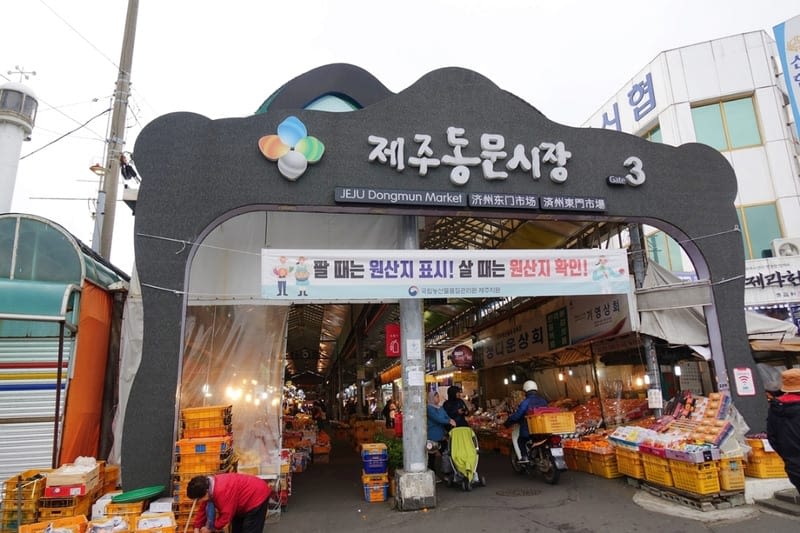 Dongmun Traditional MarketShoppingJeju city
Dongmun Traditional MarketShoppingJeju city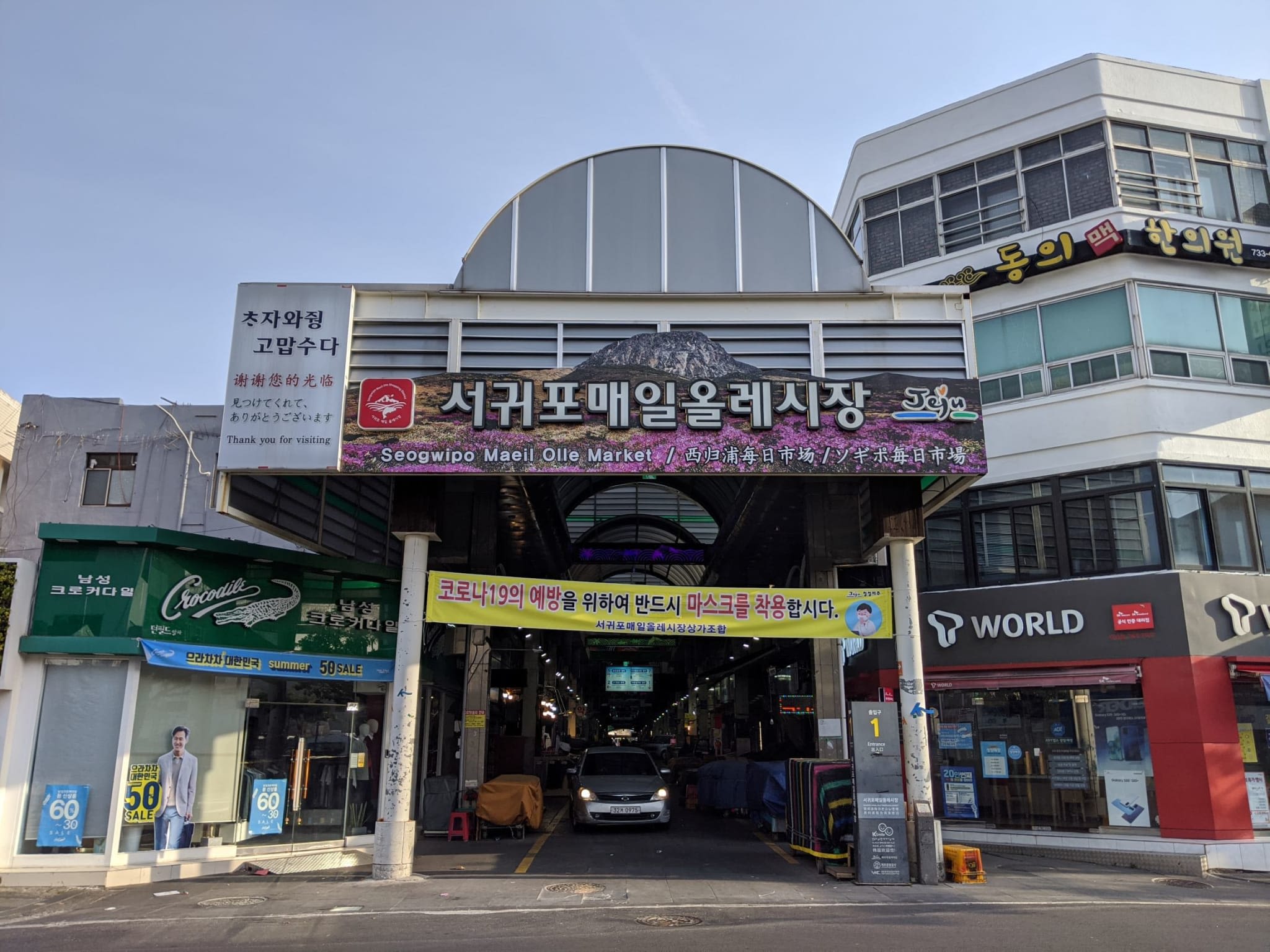 Seogwipo Maeil Olle MarketShoppingSeogwipo
Seogwipo Maeil Olle MarketShoppingSeogwipo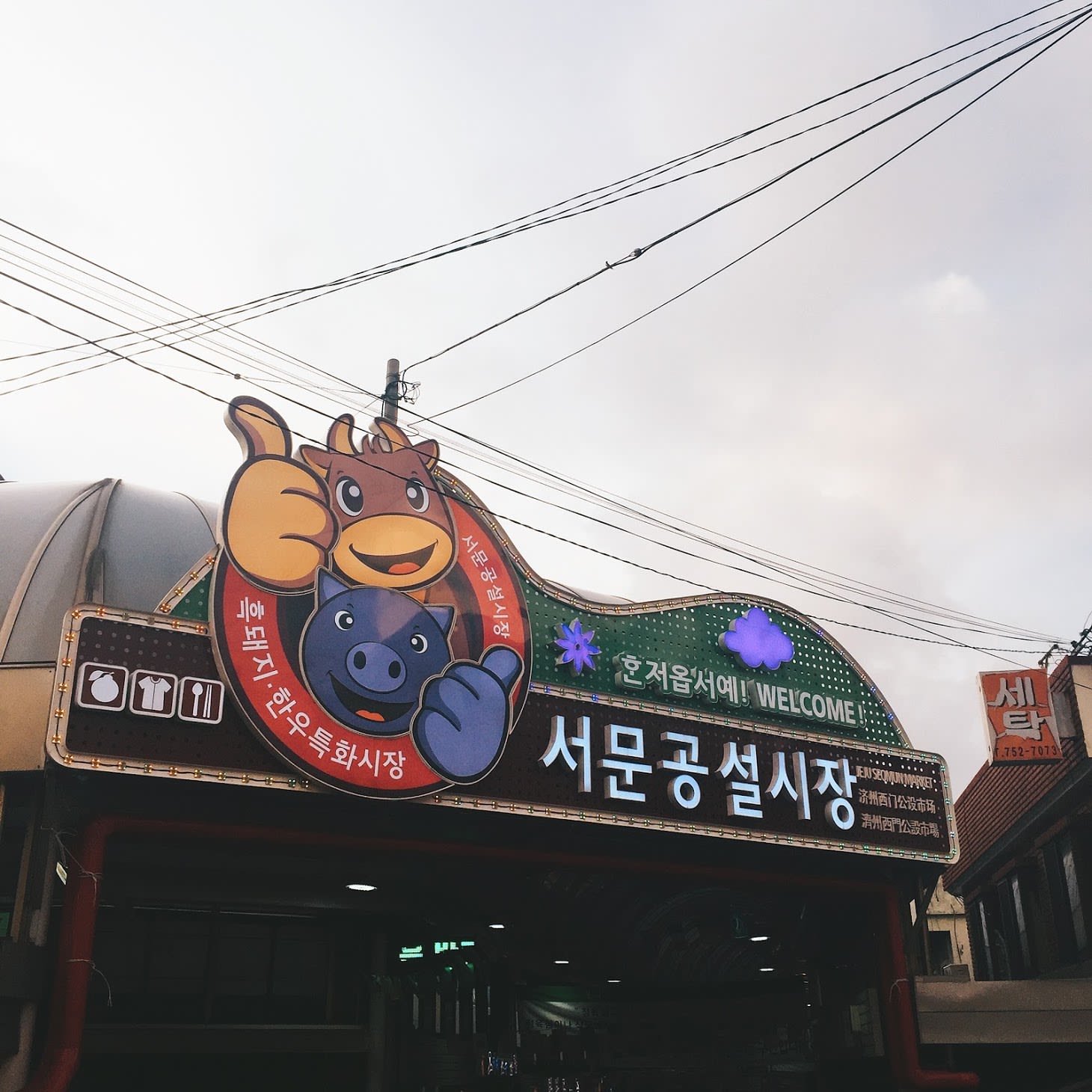 Seomun MarketShoppingJeju city
Seomun MarketShoppingJeju city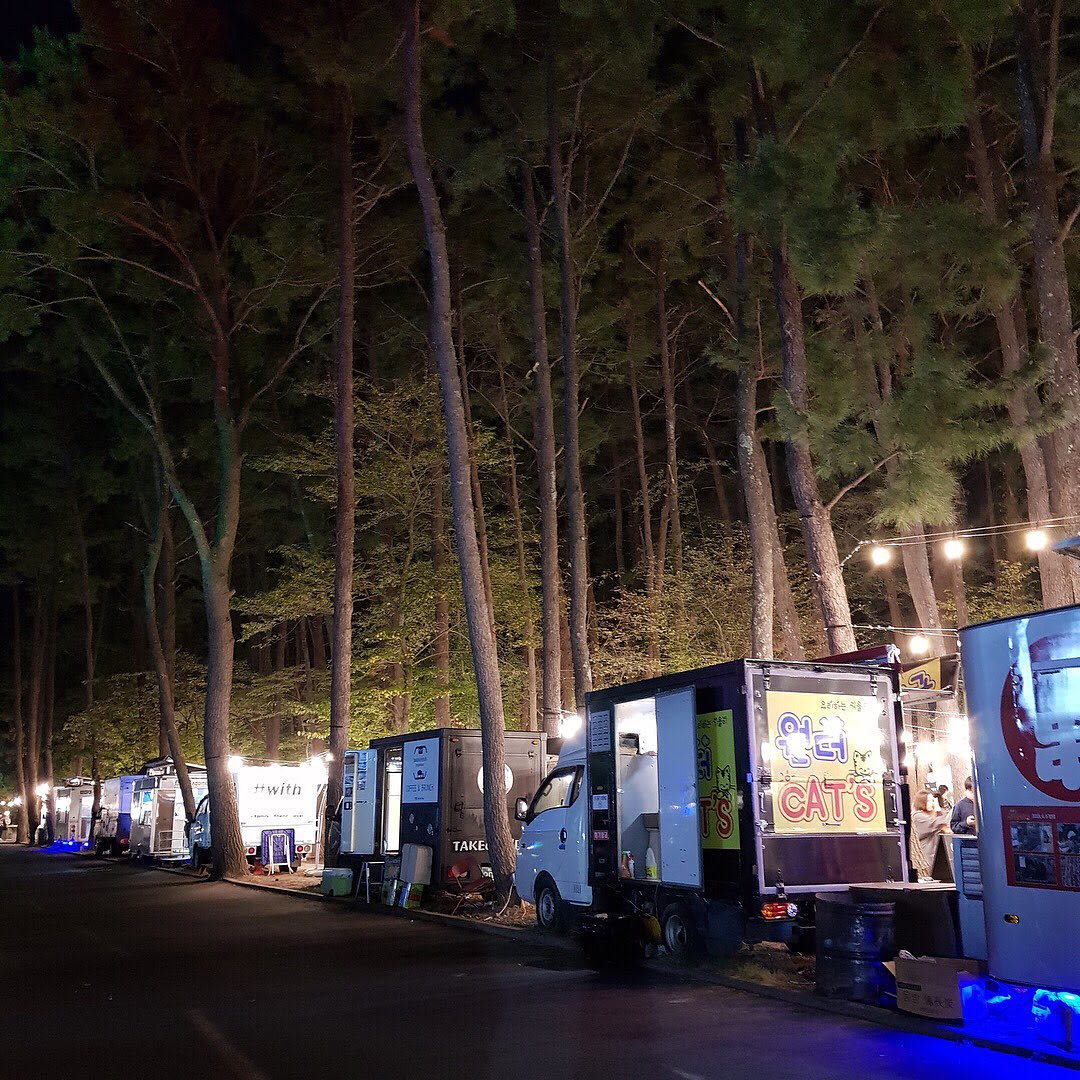 Arboretum Road Night MarketMust-SeeJeju city
Arboretum Road Night MarketMust-SeeJeju city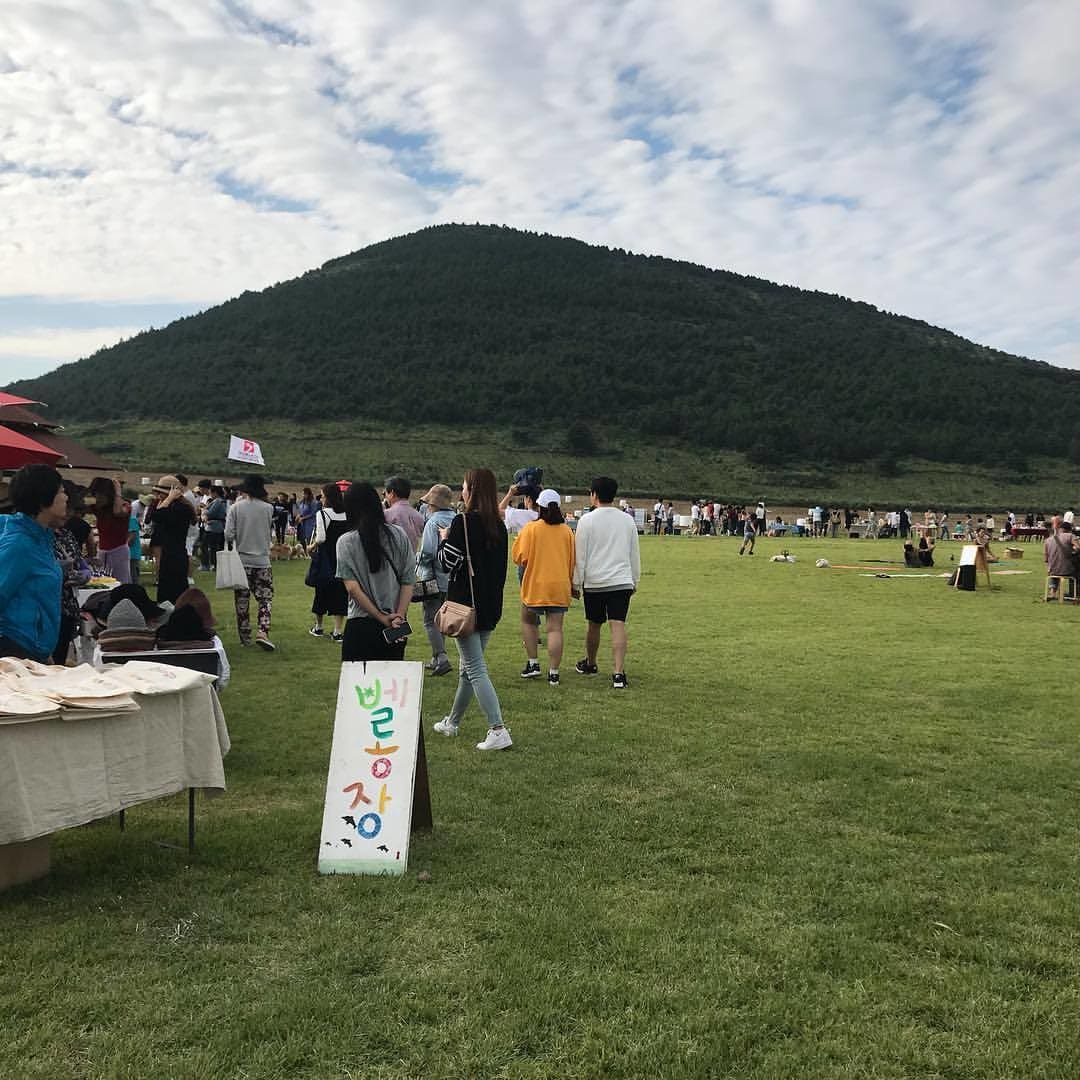 BellongjangShoppingJocheon/Guzwa
BellongjangShoppingJocheon/Guzwa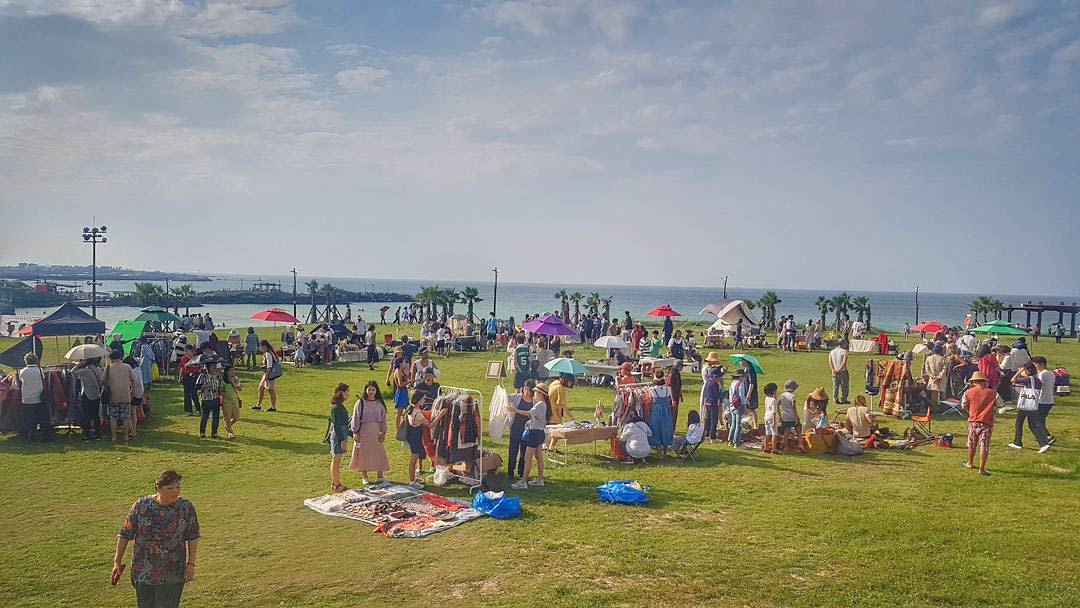 Mendolong MarketShoppingJocheon/Guzwa
Mendolong MarketShoppingJocheon/Guzwa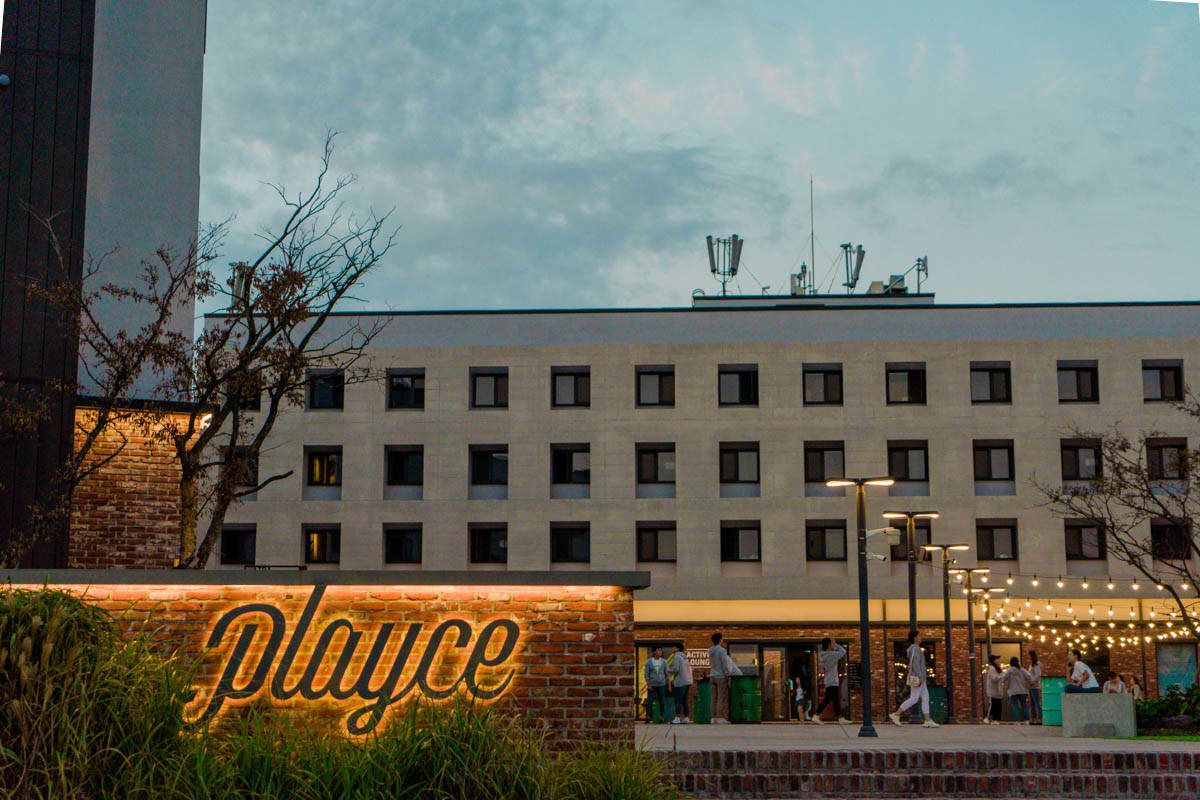 Alley MarketShoppingSeongsan/Udo
Alley MarketShoppingSeongsan/Udo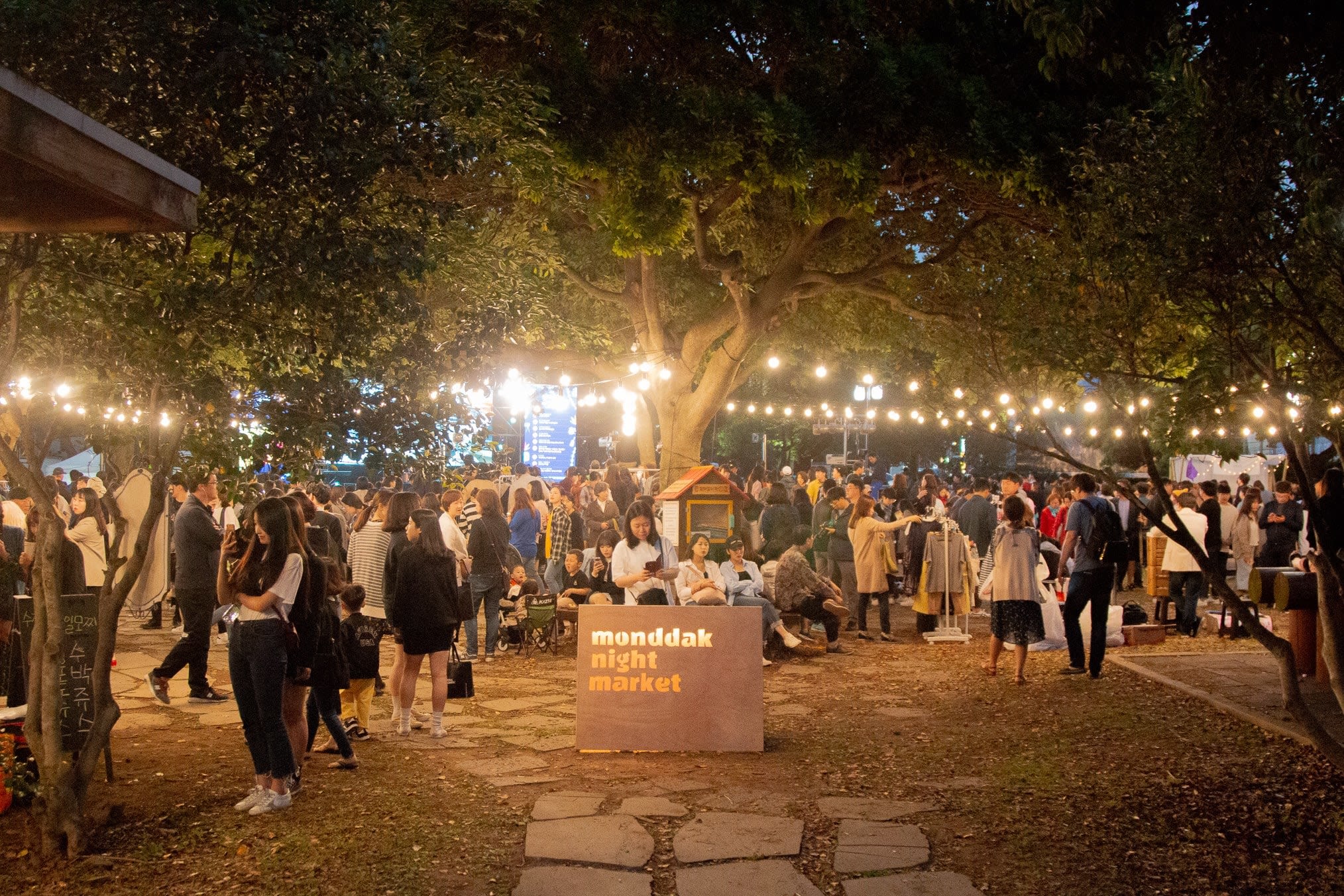 Yamonttackteoljang MarketShoppingJeju city
Yamonttackteoljang MarketShoppingJeju city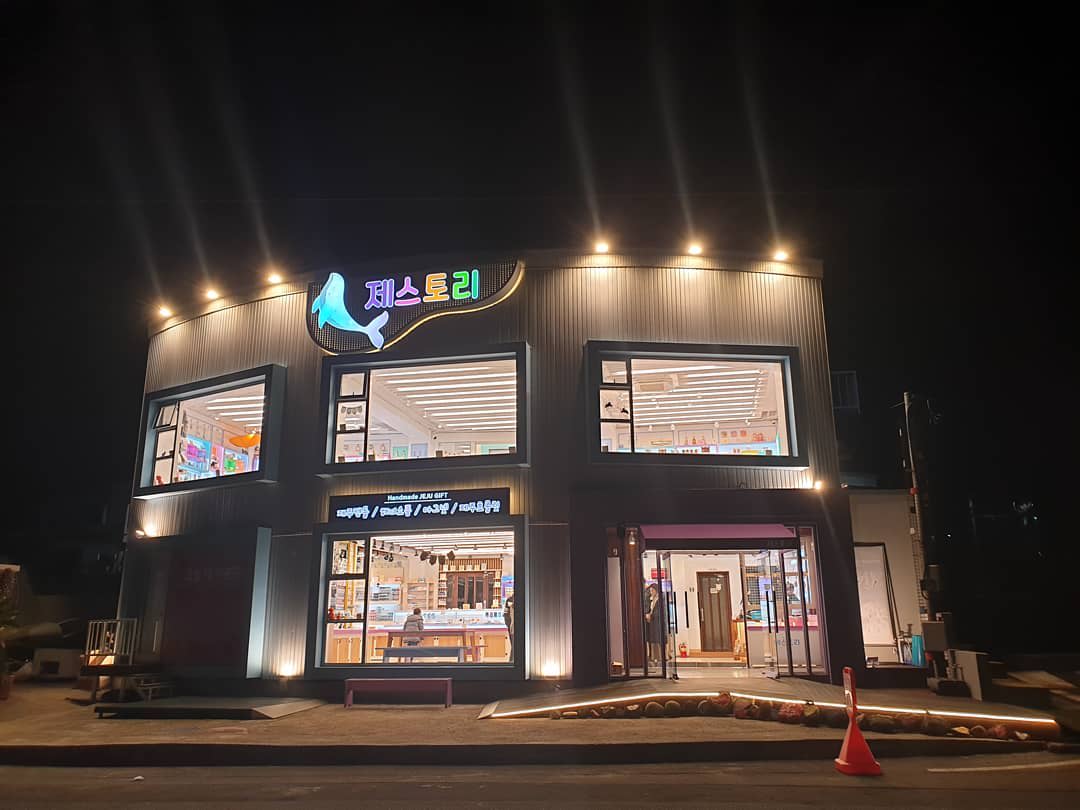 JestoryShoppingSeogwipo
JestoryShoppingSeogwipo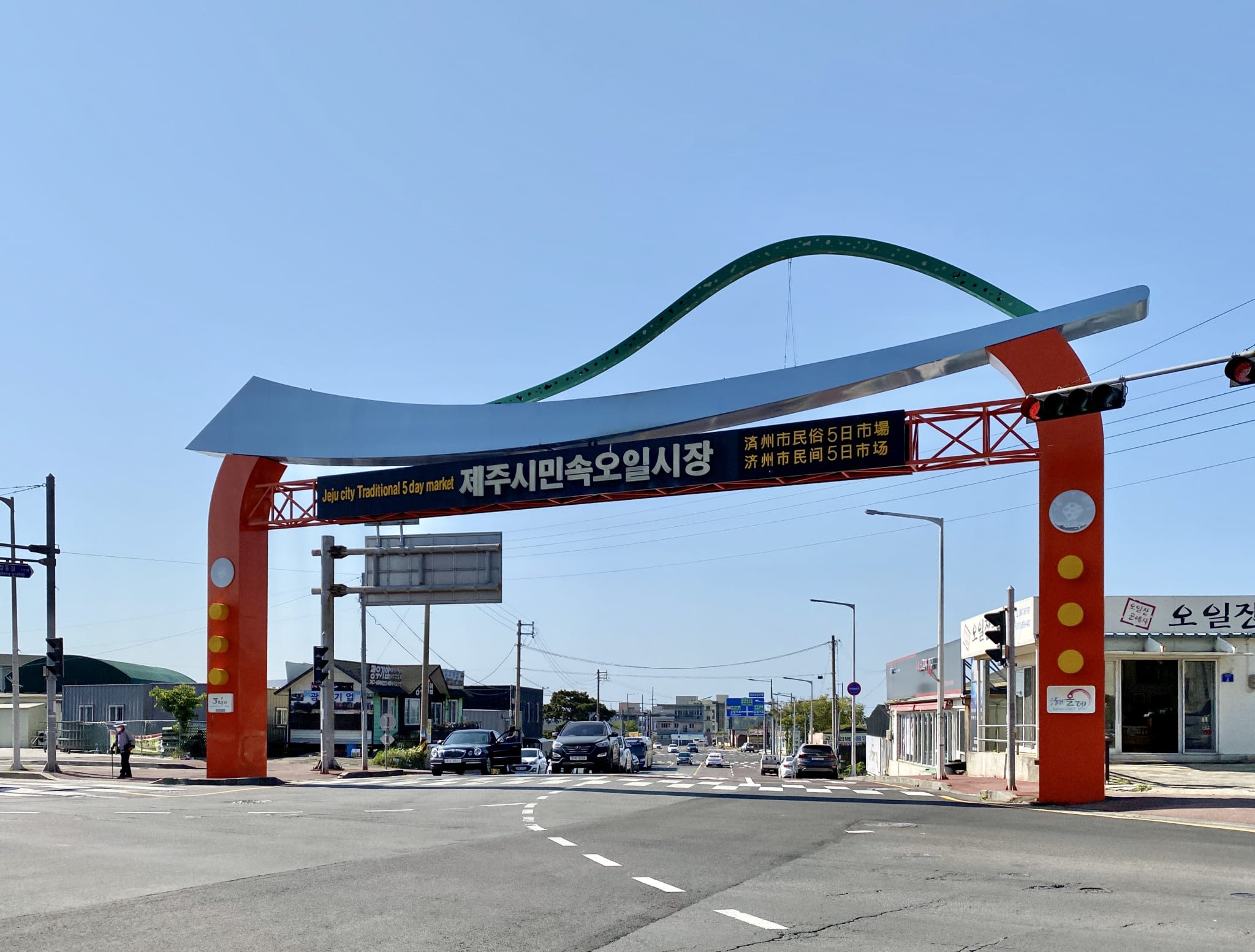 Jeju City Traditional 5-day MarketShoppingJeju city
Jeju City Traditional 5-day MarketShoppingJeju city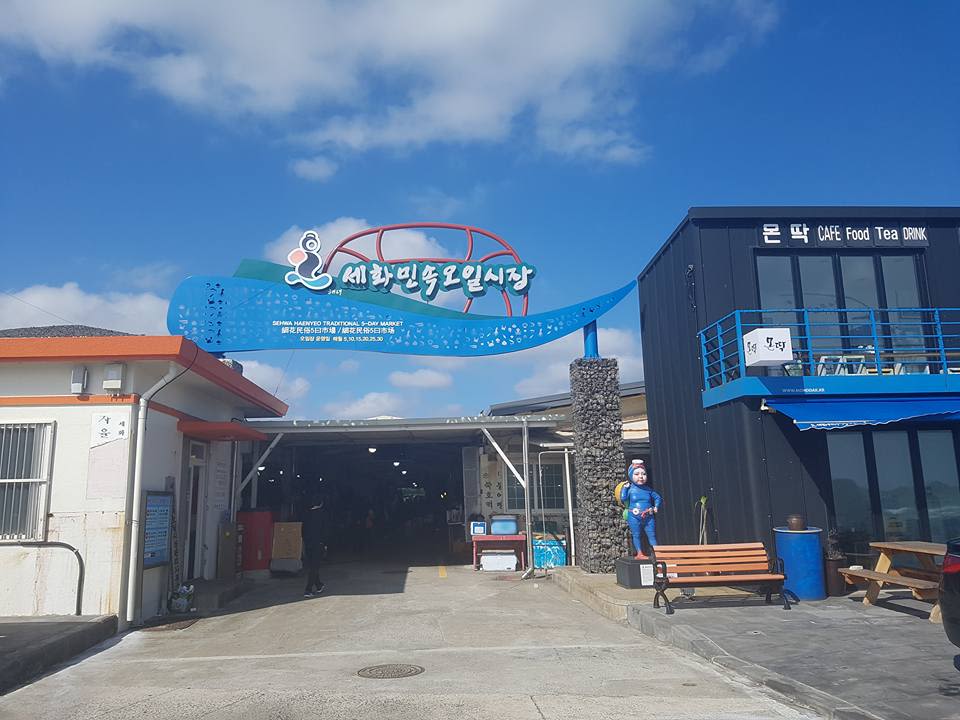 Sehwa Folk Fifth-day MarketShoppingJocheon/Guzwa
Sehwa Folk Fifth-day MarketShoppingJocheon/Guzwa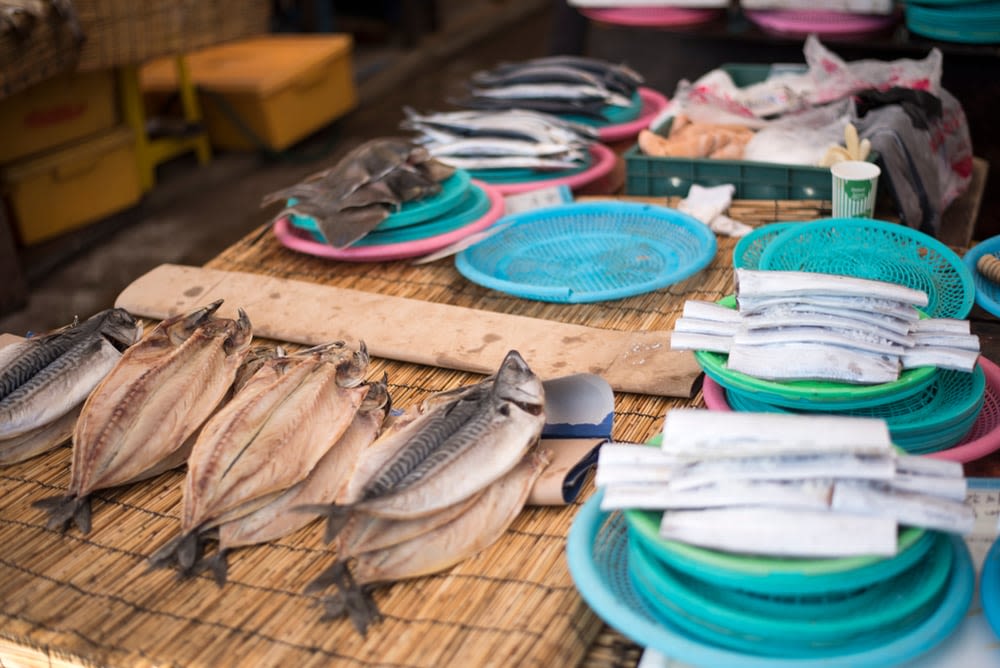 Jungmun Five-day Folk MarketShoppingJungmun
Jungmun Five-day Folk MarketShoppingJungmun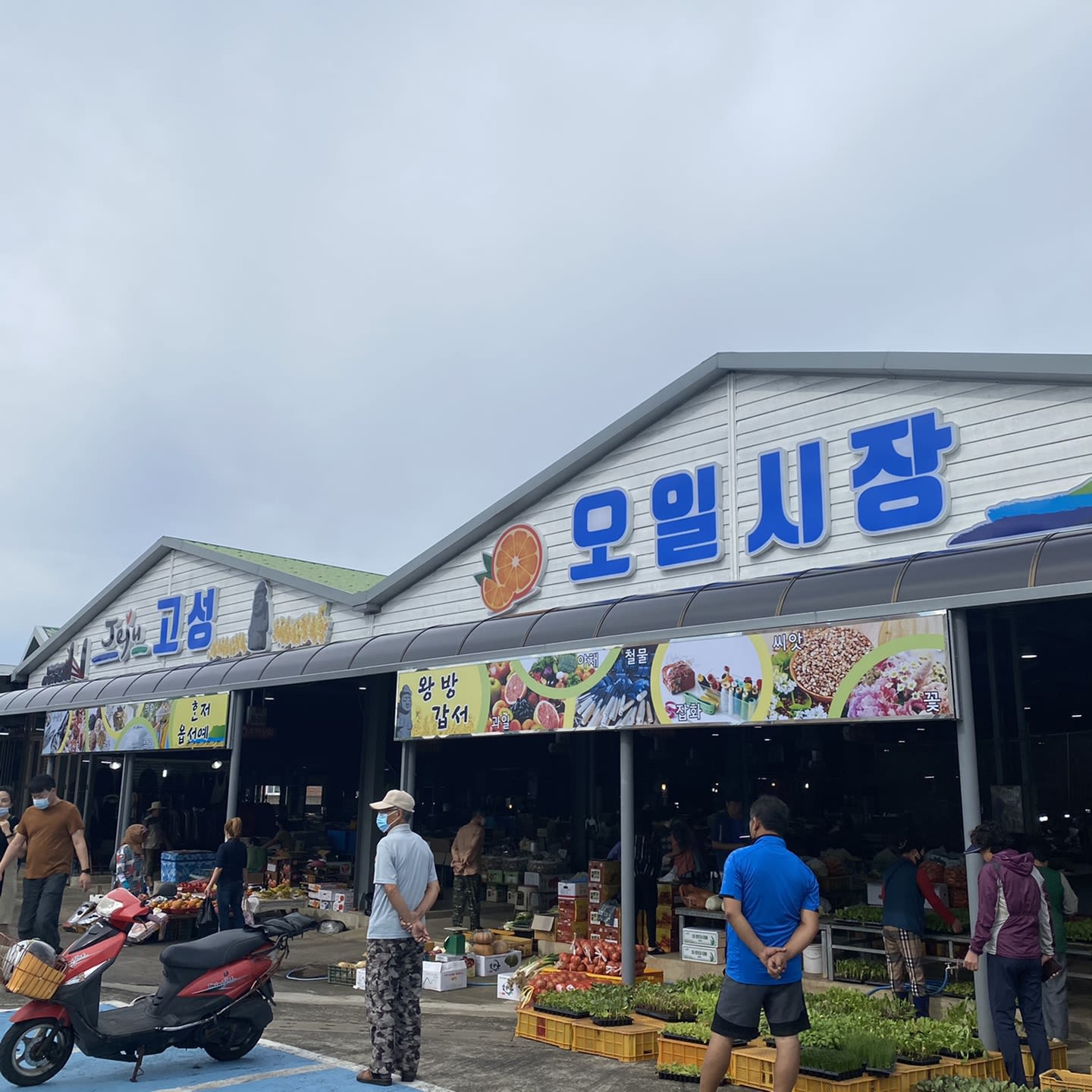 Goseong Five-day MarketShoppingSeongsan/Udo
Goseong Five-day MarketShoppingSeongsan/Udo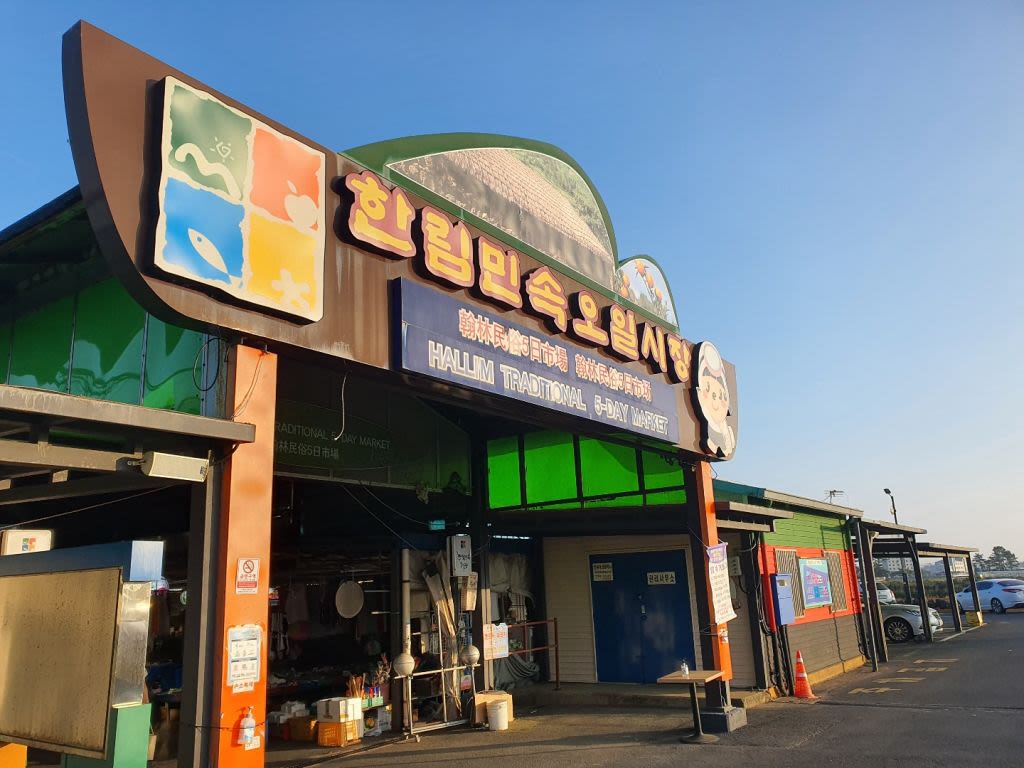 Hallim Traditional 5-day MarketShoppingAewol/Hallim
Hallim Traditional 5-day MarketShoppingAewol/Hallim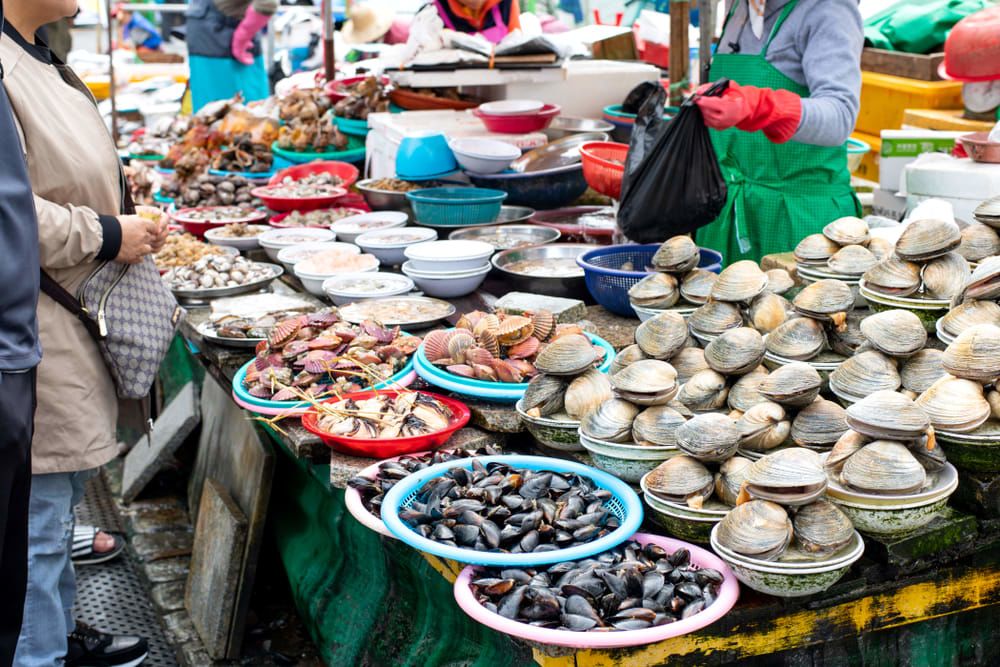 Hamdeok Five-day MarketShoppingJocheon/Guzwa
Hamdeok Five-day MarketShoppingJocheon/Guzwa
